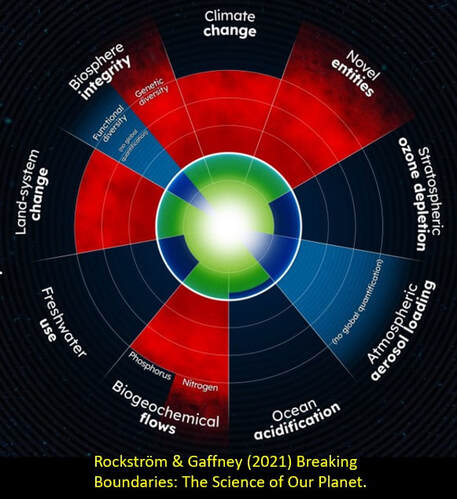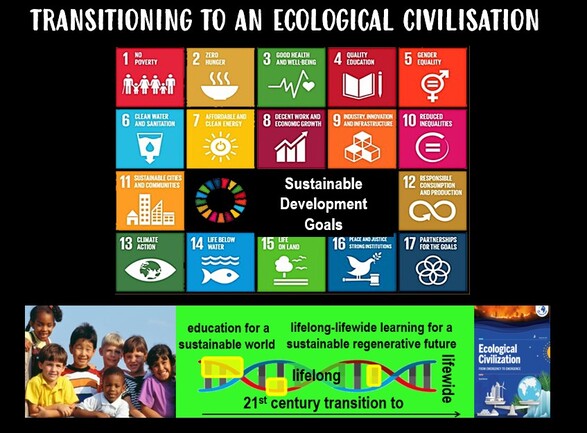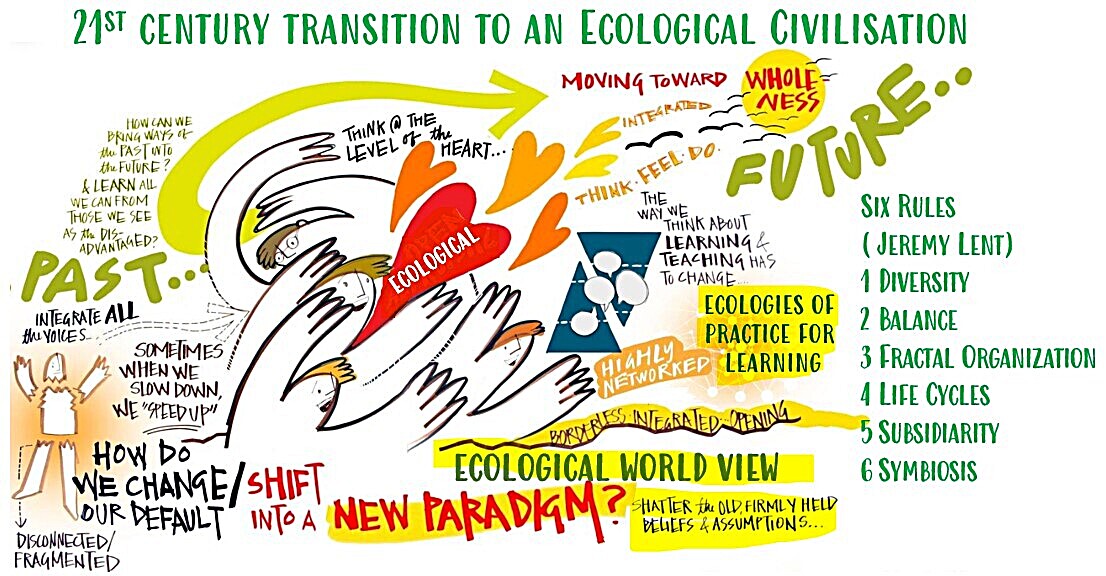This website is being developed to show how an ecological concept of whole of life (lifelong-lifewide) learning might help us transition to an Ecological Civilisation. It contains some resources that I have found useful to think about an Ecological Civilisation and notes and articles that share my thinking Norman Jackson
Image credit - adapted from a drawing by Sita Magnusun

21st Century Global Challenge
The history of mankind is a history of learning and using learning to perform and achieve at all scales from individuals, through groups and communities, to nations and beyond. As a species we are who we are, for better or worse, because of what we have learnt and how we have applied our learning. For much of our history as a species our learning has been deeply connected to the ecological principles that enable all life to flourish. But as human populations have grown and more technologically advanced societies have emerged, we have become progressively decoupled from these principles to the point where science is now revealing the full extent of the damage we have caused to many of the systems that support our existence and all other life on our planet:. Humans currently consume resources at a rate 1.6 times what the Earth can sustain(1). So great are the impacts of humans on the planet that we have entered a new geological era - the Anthropocene a manifestation of which is the fact that we have exceeded 5 of 9 planetary boundaries considered essential for life (1).
Clearly, we have reached a tipping point in human history in which our past and current behaviors have upset the delicate balance of a fragile world and we are likely to bring about our own demise unless we change what we are doing. We need vision and global leadership, that rises above national political interests to help us make the transition to what Thomas Berry describes as a new ecological era. "The main human task….is to assist in activating the intercommunion of all the living and non-living components of the Earth in what can be considered the emerging ecological period of Earth development”(2). The simple truth is that the development of all life on Earth has always been ecological and we are merely attempting to incorporate such awareness into our own thinking and practice in order to transition to a life-affirming ecological civilisation (3.4,5) : a civilization that uses nature’s own design principles to change our operating system to one that naturally leads to life-affirming policies and practices rather than rampant extraction and devastation (3,4.5).

Hope for the future - the role of whole of life learning through action
We can look at our present situation in despair, or, we can view the transition we have to make during the 21st century as a necessary part of our evolution as an intelligent species.There are already visions of an ecological future to guide us (3,4,5) and global leadership, in the form of the United Nations 2030 Agenda for Sustainable Development (6), offers the current blueprint for our survival. Working with the SDGs will always be a work in progress so education and learning throughout life are key.to working out, in an emergent way, what we have to do in order to make the transition to an ecological civilisation..
Optimistic views of the future guide us toward a universal culture of lifelong learning (7) through which collective human efforts are directed to achieving a more sustainable and regenerative future. In fact we cannot reach the goal of an ecological civilisation without humanity’s commitment to a life of learning and action directed to securing this future.
Education has its own goal – SDG#4, to “Ensure inclusive and equitable quality education and promote lifelong learning opportunities for all.” The aim of this SDG is to educate the world to encourage and support sustainable development, but it also contains within it a new and important role for lifelong learning – to enable individuals and societies to learn how to sustain themselves and the world. It’s a vision and culture that reaches beyond promoting lifelong learning opportunities for all, to the idea that “the whole of life is learning therefore education can have no ending.”(8)
To achieve this cultural transformation and live our lives in a sustainable, regenerative way, humanity must embrace an ecological world view within which all human activities, including learning, practice and achievement are understood in relationship to the world in which they are enacted (9). If we are to succeed in learning and acting for sustainable, regenerative futures, we must embrace the idea that we are not just independent beings we are interbeings (10), enacting life within and with an ecological world of relationships, connectivity, and interdependency. We need a vision and concept of lifelong learning and action that embraces consciously and explicitly the lifewide dimensions of learning and action in everyday life and its fundamentally ecological nature (9) and we also need a broader moral purpose for education and learning that includes learning for others and other things, and encompasses the health and vitality of our life sustaining planet. By recognising that we are fundamentally ecological interbeings and that learning and practice are ecological in nature, we are laying the foundations for a civilisation and a future based on ecological principles.
The Earth Charter attempts to provide a foundation of ecological principles. It is an international declaration of fundamental values and principles for building a just, sustainable and regenerative, and peaceful global society in the 21st century. These principles and values point us in the direction of an Ecological Civilisation.
Sources
1 Rockström, J. & Gaffney, O (2021) Breaking Boundaries: The Science of Our Planet. DK
2 Berry, T. (1999). The Great Work: Our Way into the Future. New York: Three Rivers Press
3 Lent, J. (2021). What Does An Ecological Civilization Look Like? YES Magazine Spring 2021 Available
4 Lent, J. (2022) The Web of Meaning London: Profile Books
5 Korten, D. (2021) Ecological Civilisation: From Emergency to Emergence
6 UN General Assembly Resolution 70/1. Transforming our world: The 2030 Agenda for Sustainable Development. 7 UNESCO (2020). Embracing a culture of lifelong learning: Contribution to the Futures of Education initiative Report. A transdisciplinary expert consultation UNESCO Institute for Lifelong Learning: Paris Available at ht
8 Lindeman, E. (1926) The Meaning of Adult Education. New York: New Republic (1989 edn) Oklahoma Research Center for Continuing Professional and Higher Education.
9 Jackson, N.J. (2022) Steps To An Ecology of Lifelong-Lifewide Learning for Sustainable, Regenerative Futures In K. Evans, Lee, W.O. Markowitsch, J. & Zukas M. (Eds) Third International Handbook of Lifelong Learning Springer Available at https://link.springer.com/referenceworkentry/10.1007/978-3-030-67930-9_15-
10 Hanh, T.N. (1992). Peace is Every Step: The Path of Mindfulness in Everyday Life. New York: Bantam Books Available at https://archive.org/stream/PeaceIsEveryStep-ThichNhatHanh/ThichTextNew_djvu.txt
We can look at our present situation in despair, or, we can view the transition we have to make during the 21st century as a necessary part of our evolution as an intelligent species.There are already visions of an ecological future to guide us (3,4,5) and global leadership, in the form of the United Nations 2030 Agenda for Sustainable Development (6), offers the current blueprint for our survival. Working with the SDGs will always be a work in progress so education and learning throughout life are key.to working out, in an emergent way, what we have to do in order to make the transition to an ecological civilisation..
Optimistic views of the future guide us toward a universal culture of lifelong learning (7) through which collective human efforts are directed to achieving a more sustainable and regenerative future. In fact we cannot reach the goal of an ecological civilisation without humanity’s commitment to a life of learning and action directed to securing this future.
Education has its own goal – SDG#4, to “Ensure inclusive and equitable quality education and promote lifelong learning opportunities for all.” The aim of this SDG is to educate the world to encourage and support sustainable development, but it also contains within it a new and important role for lifelong learning – to enable individuals and societies to learn how to sustain themselves and the world. It’s a vision and culture that reaches beyond promoting lifelong learning opportunities for all, to the idea that “the whole of life is learning therefore education can have no ending.”(8)
To achieve this cultural transformation and live our lives in a sustainable, regenerative way, humanity must embrace an ecological world view within which all human activities, including learning, practice and achievement are understood in relationship to the world in which they are enacted (9). If we are to succeed in learning and acting for sustainable, regenerative futures, we must embrace the idea that we are not just independent beings we are interbeings (10), enacting life within and with an ecological world of relationships, connectivity, and interdependency. We need a vision and concept of lifelong learning and action that embraces consciously and explicitly the lifewide dimensions of learning and action in everyday life and its fundamentally ecological nature (9) and we also need a broader moral purpose for education and learning that includes learning for others and other things, and encompasses the health and vitality of our life sustaining planet. By recognising that we are fundamentally ecological interbeings and that learning and practice are ecological in nature, we are laying the foundations for a civilisation and a future based on ecological principles.
The Earth Charter attempts to provide a foundation of ecological principles. It is an international declaration of fundamental values and principles for building a just, sustainable and regenerative, and peaceful global society in the 21st century. These principles and values point us in the direction of an Ecological Civilisation.
Sources
1 Rockström, J. & Gaffney, O (2021) Breaking Boundaries: The Science of Our Planet. DK
2 Berry, T. (1999). The Great Work: Our Way into the Future. New York: Three Rivers Press
3 Lent, J. (2021). What Does An Ecological Civilization Look Like? YES Magazine Spring 2021 Available
4 Lent, J. (2022) The Web of Meaning London: Profile Books
5 Korten, D. (2021) Ecological Civilisation: From Emergency to Emergence
6 UN General Assembly Resolution 70/1. Transforming our world: The 2030 Agenda for Sustainable Development. 7 UNESCO (2020). Embracing a culture of lifelong learning: Contribution to the Futures of Education initiative Report. A transdisciplinary expert consultation UNESCO Institute for Lifelong Learning: Paris Available at ht
8 Lindeman, E. (1926) The Meaning of Adult Education. New York: New Republic (1989 edn) Oklahoma Research Center for Continuing Professional and Higher Education.
9 Jackson, N.J. (2022) Steps To An Ecology of Lifelong-Lifewide Learning for Sustainable, Regenerative Futures In K. Evans, Lee, W.O. Markowitsch, J. & Zukas M. (Eds) Third International Handbook of Lifelong Learning Springer Available at https://link.springer.com/referenceworkentry/10.1007/978-3-030-67930-9_15-
10 Hanh, T.N. (1992). Peace is Every Step: The Path of Mindfulness in Everyday Life. New York: Bantam Books Available at https://archive.org/stream/PeaceIsEveryStep-ThichNhatHanh/ThichTextNew_djvu.txt

